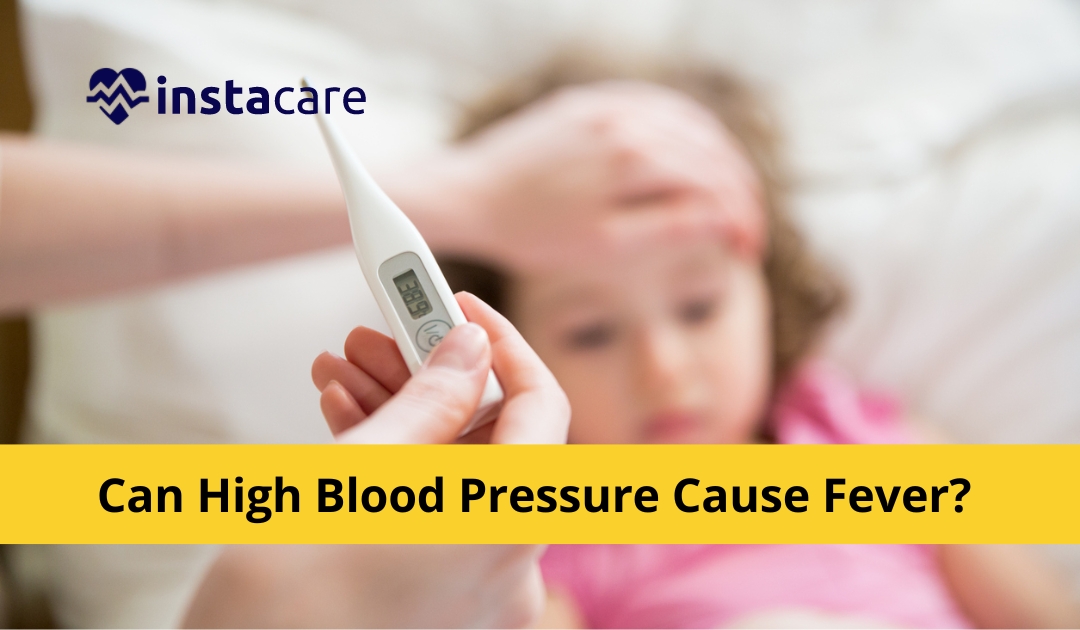High blood pressure and fever are two conditions which, despite their common occurrence in everyday life, rarely have any relation to one another – or at least that's what we've been taught. But the truth is that, depending on the individual case, there can be a surprising link between high blood pressure and fever. While it may seem counterintuitive, research has indicated that high blood pressure plays an important role in managing fevers and other types of infections. In this blog post we'll delve into how this relationship works, why it matters and most importantly – how you can use this newfound knowledge to better manage your health.
What is high blood pressure?
High blood pressure, also known as hypertension, is a condition that affects millions of people around the world. When your blood pressure is consistently higher than normal, it can be damaging to your heart and put you at risk for developing other medical conditions.
Usually caused by lifestyle factors like obesity, lack of exercise and poor diet, having high blood pressure means your heart has to work harder to get blood throughout your body. Common symptoms of high blood pressure include headaches and vision problems, while long term effects can range from kidney disease to stroke. The good news is that with proper medical advice and lifestyle changes such as reducing salt intake and quitting smoking, most people are able to lower their blood pressure back down to healthy levels.
Causes of high blood pressure
High blood pressure, also known as hypertension, is a medical condition that can be caused by many factors. Some of these include unhealthy diet, lack of exercise, genetic predisposition, smoking and drinking alcohol, chronic stress or anxiety, and long-term kidney disease. Poor lifestyle choices such as eating unhealthy foods high in fat and sodium can increase the risk of high blood pressure.
Being inactive can also contribute to developing hypertension. In some cases, there are underlying medical causes including hormonal imbalances or certain medications that lead to higher blood pressure levels. An individual’s family history may be another factor in developing high blood pressure; it is important to get regular check-ups so potential problems can be discovered early on and hopefully avoided completely with proper preventive steps.
View More: Meningitis - Causes Symptoms And Treatment
Who is more prone to high blood pressure?
High blood pressure is a dangerous medical condition that can contribute to heart failure and stroke if it is not caught and managed. Many individuals may be unaware of their risk factors, but there are some populations of people who are more prone to having high blood pressure than others. For example, the elderly usually have a higher risk because of the gradual decline in arteries and other organs with age.
Other groups that have an increased likelihood of high blood pressure include african americans, those who suffer from obesity or diabetes, people with a diet rich in sodium and fat, and individuals who are chronically stressed or exposed to second-hand smoke. Knowing your risk level for high blood pressure is critical in order to take proper steps to protect your health.
Is high blood pressure genetic?
High blood pressure is a very common medical condition, and for many people, their blood pressure is determined by genetics. Studies have found that if one parent has high blood pressure, the risk of a child having high blood pressure increases significantly. On the other hand, if both parents have high blood pressure, then the likelihood of their child having high blood pressure rises even higher.
However, it is important to note that lifestyle factors can still affect whether or not someone develops high blood pressure; even those with a family history of the condition can take steps to reduce the risk by eating a healthy diet, maintaining an active lifestyle and avoiding unhealthy habits like smoking and drinking alcohol excessively. Ultimately, being aware of your family's health history plays an important role in taking measures to protect your own cardiovascular health.
Types of high blood pressure
There are two types of high blood pressure - primary, also known as essential hypertension, and secondary hypertension. Primary hypertension is the most common type and causes are typically unclear, but may be caused by a combination of genetic and environmental factors.
By contrast, secondary hypertension is caused by another medical condition or particular lifestyle behaviors such as obesity or substance abuse. Knowing which type you have can be incredibly helpful in working out how to properly manage it, so if you have any doubt about what your high blood pressure is categorized as it's important to seek guidance from your doctor.
Can high blood pressure cause fever?
High blood pressure can be the cause of fever in some cases. When a person has elevated blood pressure their body is essentially running on overdrive, which places extra strain on the circulatory system and other organs. This often causes a fever as the body tries to maintain its normal temperature ranges despite the higher levels of strain happening within it.
While this can be dangerous, it most commonly occurs in people with severe hypertension who are at risk of further complications due to their high blood pressure. As such, if you or someone you know experiences a fever that does not clear up after treatments for other illnesses have been taken, then checking for high blood pressure might be necessary. Consulting a healthcare provider for advice is always recommended when experiencing any type of prolonged fever.
High blood pressure signs and symptoms
High blood pressure can be a serious health condition, and it's important to know what its signs and symptoms are so that you can be alerted if something is off. It's possible to have high blood pressure without any physical signs or symptoms, however there are some that could indicate your levels may be elevated.
Some symptoms include headache, shortness of breath, unusual fatigue, dizziness or nosebleeds. If you experience any of these symptoms or feel as though your heart is racing or skipping beats, it's best to consult a doctor for advice on a next step. Taking preventative steps earlier rather than later can help keep your blood pressure in check in the long run.
View More: What Causes Swelling On Feet - 7 Causes Treatments And Remedies
How is high blood pressure treated?
High blood pressure, or hypertension, is a condition that can be treated and managed through lifestyle changes such as a healthy diet coupled with physical activity and reducing stress levels. Medications can also be prescribed to treat hypertension. Depending on the severity of the diagnosis, these may include ace inhibitors, beta blockers, angiotensin receptor blockers and calcium channel blockers among others.
These medications work by weakening the heart's contractions, widening blood vessels and decreasing sodium retention in order to reduce blood pressure to more normal levels. Alongside these treatments, patients are encouraged to monitor their own progress and keep doctors informed of any changes along regular check-ups. With proper management, high blood pressure can be successfully brought under control and managed long-term.
Conclusion
High blood pressure is a common condition that can be easily treated. However, if left untreated, high blood pressure can lead to serious health complications such as heart disease, stroke, and kidney failure. If you have high blood pressure, it is important to see your doctor so that they can prescribe the appropriate treatment for you. In most cases, high blood pressure can be controlled through lifestyle changes and medication.
Please book an appointment with the Best General Physician in Lahore, Karachi, Islamabad, and all major cities of Pakistan through InstaCare, or call our helpline at 02137136090 to find a verified doctor for your disease.
Source: https://instacare.pk/blog/high-blood-pressure-and-fever










